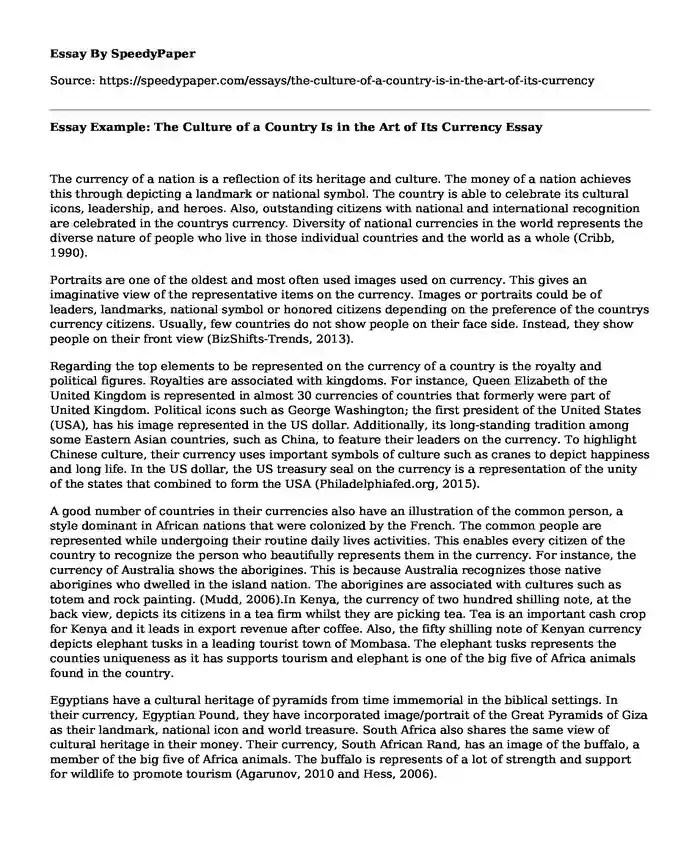The currency of a nation is a reflection of its heritage and culture. The money of a nation achieves this through depicting a landmark or national symbol. The country is able to celebrate its cultural icons, leadership, and heroes. Also, outstanding citizens with national and international recognition are celebrated in the countrys currency. Diversity of national currencies in the world represents the diverse nature of people who live in those individual countries and the world as a whole (Cribb, 1990).
Portraits are one of the oldest and most often used images used on currency. This gives an imaginative view of the representative items on the currency. Images or portraits could be of leaders, landmarks, national symbol or honored citizens depending on the preference of the countrys currency citizens. Usually, few countries do not show people on their face side. Instead, they show people on their front view (BizShifts-Trends, 2013).
Regarding the top elements to be represented on the currency of a country is the royalty and political figures. Royalties are associated with kingdoms. For instance, Queen Elizabeth of the United Kingdom is represented in almost 30 currencies of countries that formerly were part of United Kingdom. Political icons such as George Washington; the first president of the United States (USA), has his image represented in the US dollar. Additionally, its long-standing tradition among some Eastern Asian countries, such as China, to feature their leaders on the currency. To highlight Chinese culture, their currency uses important symbols of culture such as cranes to depict happiness and long life. In the US dollar, the US treasury seal on the currency is a representation of the unity of the states that combined to form the USA (Philadelphiafed.org, 2015).
A good number of countries in their currencies also have an illustration of the common person, a style dominant in African nations that were colonized by the French. The common people are represented while undergoing their routine daily lives activities. This enables every citizen of the country to recognize the person who beautifully represents them in the currency. For instance, the currency of Australia shows the aborigines. This is because Australia recognizes those native aborigines who dwelled in the island nation. The aborigines are associated with cultures such as totem and rock painting. (Mudd, 2006).In Kenya, the currency of two hundred shilling note, at the back view, depicts its citizens in a tea firm whilst they are picking tea. Tea is an important cash crop for Kenya and it leads in export revenue after coffee. Also, the fifty shilling note of Kenyan currency depicts elephant tusks in a leading tourist town of Mombasa. The elephant tusks represents the counties uniqueness as it has supports tourism and elephant is one of the big five of Africa animals found in the country.
Egyptians have a cultural heritage of pyramids from time immemorial in the biblical settings. In their currency, Egyptian Pound, they have incorporated image/portrait of the Great Pyramids of Giza as their landmark, national icon and world treasure. South Africa also shares the same view of cultural heritage in their money. Their currency, South African Rand, has an image of the buffalo, a member of the big five of Africa animals. The buffalo is represents of a lot of strength and support for wildlife to promote tourism (Agarunov, 2010 and Hess, 2006).
In recognition of leadership and political icons, most countries have portraits of their presidents or otherwise once their great leaders that the world hugely recognized on their currencies. Indian currency, the rupees, notes have an image of Mahatma Gandhi. The latter is known in the world for his good leadership skills and for transforming many lives through his speeches and work (Design Observer, 2015).
References
Hess, J. B. (2006). Art and architecture in postcolonial Africa. Jefferson N.C. [u.a.: McFarland
Cribb, J. (1990). Money. New York: Knopf.
Mudd, D. (2006). All the money in the world. New York: Collins.
BizShifts-Trends,. (2013). Color of Money-- Branding a Country: Currency Symbolizes the Fabric of a Countrys Identity, People, Tradition, Culture.... Retrieved 17 July 2015, from http://bizshifts-trends.com/2013/04/22/color-of-money-branding-of-a-country-currency-symbolizes-the-fabric-of-a-countrys-identity-people-tradition-culture/
Philadelphiafed.org,. (2015). Symbols on American Money - Philadelphia Fed. Retrieved 17 July 2015, from https://www.philadelphiafed.org/education/teachers/publications/symbols-on-american-money/
Popova, M. (2015). The Art of Money. Brain Pickings. Retrieved 17 July 2015, from http://www.brainpickings.org/2010/04/27/the-art-of-money/
Design Observer,. (2015). The Art of Money. Retrieved 17 July 2015, from http://designobserver.com/article.php?id=38812
Agarunov, E. (2010). The Art of Currency: Unique Notes From Around the World - Tuts+ Design & Illustration Article. Design & Illustration Tuts+. Retrieved 17 July 2015, from http://design.tutsplus.com/articles/the-art-of-currency-unique-notes-from-around-the-world--psd-11311
Cite this page
Essay Example: The Culture of a Country Is in the Art of Its Currency. (2020, Feb 18). Retrieved from https://speedypaper.net/essays/the-culture-of-a-country-is-in-the-art-of-its-currency
Request Removal
If you are the original author of this essay and no longer wish to have it published on the SpeedyPaper website, please click below to request its removal:
- Classification of the American Tribes - Free Essay in Ethnography
- Obesity Essay Example from Our Database
- Essay Sample on Business Intelligence Solutions Requirements and Analysis
- Linguistic Elements of English as the Building Blocks of Literary Styles
- Free Essay Example: Embroidery
- Essay Example: Retail Food Group
- Free Essay: The Criticality of Operational Business Decisions Made Within the Game
Popular categories





